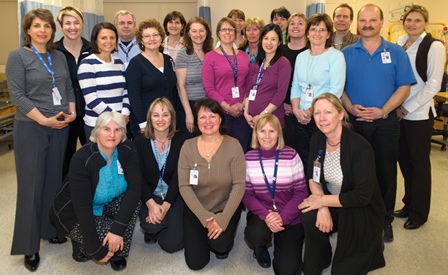toh
Our Rehabilitation Teams
 At The Ottawa Hospital Rehabilitation Centre (TOHRC), patients will interact with many professionals dedicated to providing you with the best possible care using our interdisciplinary approach. Here are some of the staff members our patients may encounter:
At The Ottawa Hospital Rehabilitation Centre (TOHRC), patients will interact with many professionals dedicated to providing you with the best possible care using our interdisciplinary approach. Here are some of the staff members our patients may encounter:
- The physiatrist and/or primary care physician under his/her direction examines you, evaluates your condition regularly, supervises your care and prescribes necessary tests, medications, devices and treatment.
- Upon admission, you will be assigned a primary nursing team who will develop and implement your nursing care plan from admission to discharge. During an inpatient stay, nursing care is provided 24 hours a day, seven days a week. Depending on your needs, nursing care is provided by a Registered Nurse (RN) or a Registered Practical Nurse (RPN).
- The physiotherapist (PT) is your partner in evaluating and restoring strength, endurance, movement and physical abilities affected by your injury, disease or disability.
- The occupational therapist (OT) helps you learn to become as independent as possible in activities of daily living such as bathing, dressing, transfers, mobility and homemaking. Assistive devices (such as a bath seat, reacher, rocker knife, splints) and home accessibility may be investigated. An assessment of posture and mobility with the prescription of a wheelchair with appropriate seating may be provided.
- The psychologist and psychology staff are available to assist you and your family in adapting to the physical, emotional and cognitive changes often related to disability and chronic illness. Rehabilitation psychology and neuropsychology assessment and treatment can help you deal with such difficulties as depression, anxiety, pain or changes in memory and thinking.
- The social worker offers counseling to you and your family to help you adjust to lifestyle changes associated with your disability and will coordinate your discharge from TOHRC. The social worker also provides support in arranging resources like housing, transportation, home care and financial assistance.
- The pharmacist reviews your medications regularly and is available for consultation should you wish to know more about the drugs you are taking. Many people learn to take their medications safely through our self-medication program.
- The rehabilitation therapist collects, analyzes and interpreting your behaviour to create a baseline upon which treatment plans are developed and outcomes are evaluated. Working with the overall care team, the rehabilitation therapist also develops individualized, realistic treatment plans and implements cognitive behavioural strategies to increase independence and facilitate community-living skills.
- The recreation therapist will help you adapt your leisure lifestyle. A variety of recreational activities may be used to help meet your physical, social, creative, intellectual and solitary needs. The ultimate goal is to develop a satisfying leisure lifestyle and to promote active community living.
- The clinical dietitian provides assessment, treatment and counseling to patients with nutrition-related issues. Nutritional care involves individualized meal plans, education and monitoring.
- The respiratory therapist specializes in caring for people with breathing difficulties. For someone with a lung disease, such as chronic bronchitis or emphysema, or for an accident victim, breathing can be a struggle. The respiratory therapist monitors, assesses and provides the necessary treatment to facilitate the ease of breathing for those with a lung disorder.
- The speech-language pathologist assists patients who require treatment of communication problems: speaking; understanding; reading and writing. The SLP also assesses and treats swallowing problems with the goal of achieving safe eating.
- The vocational rehabilitation counsellor assists in exploring readiness and potential to work. The counsellor helps to identify vocational rehabilitation goals and develop a realistic plan for achieving them. Services are tailored to meet individual needs and include: vocational counseling and assessment; labour market research; job-seeking skills development; and liaison with employers, insurers and community service providers.
- The prosthetics and orthotics team provides ongoing assessment of patients’ prosthetic and orthotic needs. They create, fit and repair a large range of artificial limbs (prostheses) and braces (orthotics). Patients’ needs are determined in consultation with physiatrists and other team members.
- The life skills counsellor is responsible for the training and supervision of community-living skills at the Robin Easey Centre, encouraging community re-integration, increased independence and improved quality of life. Some life skills counsellors also have a role as a case coordinator and keep close contact with family members, other professionals and insurance companies as needed.
- The interfaith chaplain provides spiritual care for patients, their families, staff and volunteers. The chaplain responds to those experiencing spiritual distress, assesses spiritual needs, offers emotional support and addresses cultural, religious and ethical concerns. Spirituality is a source of strength and healing in the midst of a crisis.
- The rehabilitation engineering staff is available to modify or create assistive devices to meet your unique requirements for access and independence.
- The chiropodist provides specialized foot care through assessment, treatment, prescription of foot orthoses and/or footwear, and education.
Last updated on: March 8th, 2021


 To reset, hold the Ctrl key, then press 0.
To reset, hold the Ctrl key, then press 0.